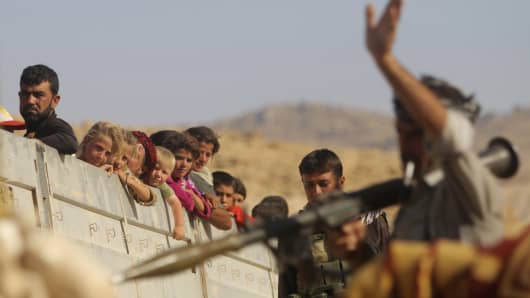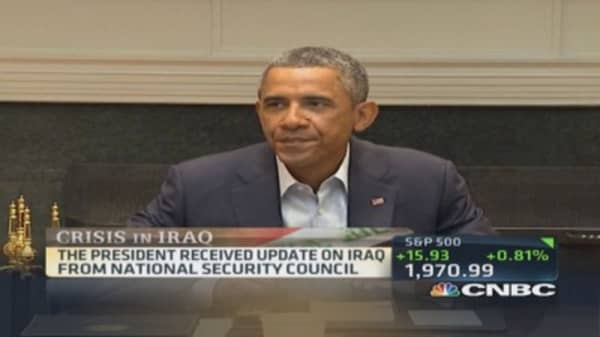The Kurdish Democratic Union Party of Syria (PYD) is battling Islamic State fighters on Mount Sinjar. Over the past week, it rescued more than 10,000 Yazidis from the mountain, escorting them to safety in Rojava, an autonomous Kurdish region in Syria. The PYD is the point of the spear against Islamic extremism. But instead of helping the PYD, Washington ignores it. The Obama administration refuses contact with PYD leaders, and rejects security cooperation.
U.S. Special Forces recently assessed humanitarian conditions on Mount Sinjar, concluding that the crisis was over. President Obama breathed a sigh of relief that could be felt across Martha's Vineyard. The U.S. was on the verge of launching an evacuation mission, violating its pledge of "no boots on the ground."
Read MorePhillips: Why is Turkey supporting Islamic State fighters?
I recently spoke with Saleh Moslem Mohamed, head of the PYD. He acknowledged that the humanitarian crisis on Mount Sinjar has eased, given U.S. airstrikes and protection by PYD militias. He insists, however, that there are still many displaced and vulnerable people in "Sengar," a triangular territory adjoining Turkey, Iraq, and Syria, which includes Mount Sinjar.
PYD rescue operations are ongoing. Its militias are battling Islamic State forces to escort Yazidis from Mount Sinjar through a humanitarian corridor out of Iraq. Peshmerga of the Kurdistan Regional Government (KRG) launched a major counterattack over the weekend and are on the verge of retaking the strategic Mosul Dam. KRG peshemrga are advancing on Mosul, the capital of Nineveh province.
The PYD is battle-hardened from fighting Syria's armed forces and Sunni extremists in Kobani and Hasakah for more than a year. Today there are 11 PYD brigades — about 1,500 fighters — engaging Islamic State fighters in Sengar. The Islamic State is trying to impose a cordon around Sengar, but the PYD has broken their lines in Rabiya.
The Islamic State succeeded in forging alliances among Kurds. Kurds are usually factionalized. When under duress, however, they come together to defend Kurdish civilians and other minorities needing their protection.
Read MoreA grand bargain between Turkey and the Kurds
The PYD is working with communities directly affected by the conflict. It supports "Sengar Resistance Units," disorganized and poorly equipped Yazidis trying to protect their community from genocide. With local Assyrians, the PYD provides sanctuary to more than 20,000 Yazidis at Camp Newroz in Rojava. The PYD bears the cost of their rescue and resettlement.
Saleh Moslem Mohammed is seeking cooperation with the United States. He applied for a visa to the U.S. four times, but the U.S. government will not respond. Washington provides arms to peshmerga of the Kurdistan Regional Government (KRG), but the PYD receives no support.
Why is Washington ignoring the PYD?
Read MoreUS airstrikes came at the right time: Phillips
Beginning in 2012, Turkey provided weapons, money, and logistical support to Sunni militants to fight Assad — and prevent the emergence of an autonomous Kurdish entity in Syria.
Ankara views the PYD as a stalking horse for the PKK, Turkish Kurds who have fought for greater political and cultural rights in Turkey since the mid-1980s. Turkey threatened to cut off water from the Euphrates River to Syria in 1999, forcing it to sign the Adana Agreement. The accord required Syria to designate the PKK as a terrorist organization and evict its members from Syrian soil. Five years after the PKK was thrown out, the PYD emerged. Turkey insists that the PKK and PYD are the same. Saleh Moslem admits they are ideologically aligned, but operationally distinct.
The United States has few friends in Iraq and Syria. It should recognize its allies — and support them.
The PYD needs more sophisticated weapons to confront well-armed Islamic State fighters. They should be equipped, either directly or via military assistance provided to the KRG.
Camp Newroz is an important sanctuary. Resources could be provided for camp operations via the UN High Commissioner for Refugees.
Instead of keeping Saleh Moslem Mohamed at arm's length, the Obama administration should give him a visa so he can meet senior officials in Washington. Cooperating with the PYD can help turn the tide against the Islamic State.
Commentary by David L. Phillips, director of the Program on Peace-building and Human Rights at Columbia University's Institute for the Study of Human Rights. He is a former senior adviser and foreign affairs expert to the U.S. Department of State during the administrations of Presidents Clinton, Bush and Obama. He is also author of the forthcoming book, "The Kurdish Spring: A New Map for the Middle East" (Transaction Publishers).






